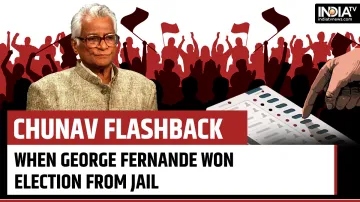Solicitor General Tushar Mehta while arguing against jailed Delhi Chief Minister Arvind Kejriwal's bail plea in the Delhi excise case cited an incident when Janata Party leader George Fernandes contested the elections from jail and won with a record margin of votes. Many would be surprised to know the fact that Fernandes - a powerful trade unionist and a prominent face of the anti-Emergency movement against then Prime Minister Indira Gandhi - successfully contested the Lok Sabha elections 1977 without visiting his constituency in Bihar.
'George Fernandes saga' in the 1970s is one of the significant chapters in Indian politics. George Fernandes is known for his fearless anti-Congress (or anti-Indira Gandhi) politics and he was one of the pillars of the Opposition for at least three decades during Congress governments.
Fernandes, who was arrested from Kolkata in June 1976 on charges of procuring dynamite sticks to blow up government establishments and railway tracks, secured his victory despite being in jail and not carrying out the poll campaigns in the constituency. His electoral victory from jail marked a shining example of people's power against the might of the ruling party in a democracy.
How Fernandes won despite being in jail
According to late Bharatiya Janata Party leader Arun Jaitley's Facebook blog titled - 'George Saheb as I knew him', Fernandes was in favour of boycotting the Lok Sabha elections 1977, but under party colleagues' pressure, he agreed to contest from Bihar's Muzaffarpur constituency.
"George’s idealism overtook political pragmatism when on 19th January, 1977, Mrs. Indira Gandhi announced the holding of the General Elections. All the political prisoners in Tihar Jail had a meeting. George was in Ward No. 17. Some of us were in Ward No. 1. We all were allowed to assemble in Ward No. 2 for political consultations. While everybody else favoured participation and contesting of elections, George was a dissenter. He wanted to boycott the 1977 Elections. He believed that this was going to be a make-belief farcical election through which Indira Gandhi would earn legitimacy and continue her dictatorship and hence the opposition by contesting must not give legitimacy to the Elections. Though in a hopeless minority, George stood to his position," Jaitley's blog read.
He further recalled, "Janata Party was formed immediately and it decided its candidates and George was chosen to contest from Bihar. He declined to sign on the Nomination Papers. It finally took Morarji Desai, who came to the Tiz Hazari Courts (where George used to come for his trials), with a set of Nomination Papers, to get George to sign them so that he could contest from prison. George eventually yielded and signed his nomination papers. Results were declared and George won the Election by a huge margin."
Fernandes' supporters in Muzaffarpur conducted intense poll campaigns against Congress candidate Nitishwar Prasad. They made posters that carried an image of Fernandes handcuffed and an appeal - "This handcuff is not on my hands but on India's democracy, the people of Muzaffarpur will definitely break it."
Fernandes's election became a mass movement and he subsequently defeated veteran Congress leader Singh by 3 lakh 34,217 votes.
Also read: Chunav Flashback: When Mahatma Gandhi's grandson Rajmohan Gandhi challenged Rajiv Gandhi in Amethi
Latest India News
